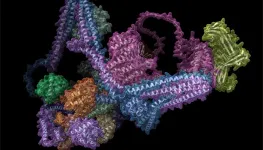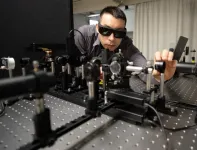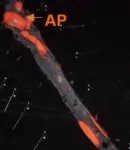(Press-News.org) [HUNTSVILLE, ALABAMA] May 11, 2023 – HudsonAlpha Institute for Biotechnology, along with several regional collaborators, was awarded $1 million from the US National Science Foundation's Regional Innovation Engines, or NSF Engines, program. They are among the more than 40 unique teams to receive one of the first-ever NSF Engines Development Awards, which aim to help partners collaborate and create economic, societal, and technological opportunities for their regions.
The funded project, entitled “Advancing carbon-neutral crop technologies to develop sustainable consumer goods (AL, GA, NC, TN)” (“Greening the Southeast” for short), aims to develop a green, circular bioeconomy for building materials and consumer goods in the Southeast that reduces climate change impacts from manufacturing by eliminating industry reliance on petroleum and environmentally costly fibers.
“Our team brings together researchers across plant genetics and genomics, crop breeders, and experts in biomass processing and biomaterial development to build a pipeline to create products from locally engineered and grown perennial grasses,” says Jeremy Schmutz, HudsonAlpha Faculty Investigator and PI of the project. “We will use underutilized marginal land, improve atmospheric carbon sequestration, reduce imports, and decarbonize industries, all while creating new jobs and training diverse individuals across STEM disciplines.”
The Greening the Southeast team includes diverse partners across the Southeast, each bringing their own expertise to help answer the question, how do we develop and sustain a circular bioeconomy in our region? Included among the numerous partners are several research institutions, industry leaders, educators, and economists. Joining HudsonAlpha are Alabama A&M University Winfred Thomas Agriculture Research Station, Auburn University, North Carolina State University, Tennessee State University, Tuskegee University, the University of Georgia, University of Tennessee, Genera, the National Society for Minorities in Agriculture, Natural Resources and Related Sciences (MANRRS), and other agricultural and workforce development partners.
“As a leading manufacturer of perennial fiber-based products in the US, our company is excited to partner with the HudsonAlpha team on this effort,” says Sam Jackson, Vice President for Feedstocks and Supply Chain for industry team member Genera. “This work will accelerate innovation in utilizing regenerative agriculture to provide significant decarbonization in products consumers use every day.”
The awardees span a broad range of states and regions, reaching geographic areas that have not fully benefited from the technology boom of the past decades. These NSF Engines Development Awards will help organizations create connections and develop their local innovation ecosystems within two years to prepare strong proposals for becoming future NSF Engines, which will each have the opportunity to receive up to $160 million.
"These NSF Engines Development Awards lay the foundation for emerging hubs of innovation and potential future NSF Engines," said NSF Director Sethuraman Panchanathan. "These awardees are part of the fabric of NSF's vision to create opportunities everywhere and enable innovation anywhere. They will build robust regional partnerships rooted in scientific and technological innovation in every part of our nation. Through these planning awards, NSF is seeding the future for in-place innovation in communities and to grow their regional economies through research and partnerships. This will unleash ideas, talent, pathways and resources to create vibrant innovation ecosystems all across our nation."
Launched by NSF's new Directorate for Technology, Innovation and Partnerships and authorized by the "CHIPS and Science Act of 2022," the NSF Engines program uniquely harnesses the nation's science and technology research and development enterprise and regional-level resources. NSF Engines aspire to catalyze robust partnerships to positively impact regional economies, accelerate technology development, address societal challenges, advance national competitiveness, and create local, high-wage jobs.
“The ENGINES program provides such a unique opportunity to have an impact that will benefit our stakeholders and advance our resilience in the face of future climate events,” said Dr. Nicole Labbé, Professor and Assistant Director of the Center for Renewable Carbon at the University of Tennessee- Knoxville. “We’re particularly excited to work with this creative and energetic team of leaders that is intent on expanding the southeast’s bioeconomy, creating a bright future with new avenues for prosperity.”
View more information about the planning grant on the Greening the Southeast website. View a map of all the NSF Engines Development Awards. More information can be found on the NSF Engines program website.
This material is based upon work supported by the National Science Foundation under Grant No. 2302898. Any opinions, findings, conclusions, or recommendations expressed in this material are those of the author(s) and do not necessarily reflect the views of the National Science Foundation.
NSF MEDIA REQUESTS: media@nsf.gov
HudsonAlpha Media Contact:
Adam Kelley, Director of Communication
akelley@hudsonalpha.org | 256-508-7199
About HudsonAlpha
HudsonAlpha Institute for Biotechnology is a nonprofit institute dedicated to developing and applying scientific advances to health, agriculture, education, and commercialization. The HudsonAlpha biotechnology campus consists of 152 acres nestled within Cummings Research Park, the nation’s second-largest research park. The state-of-the-art facilities co-locate nonprofit scientific researchers with entrepreneurs and educators. HudsonAlpha is a national and international leader in genetics and genomics research and biotech education and fosters nearly 50 diverse biotech companies on campus.
END
HudsonAlpha Institute for Biotechnology wins $1 million NSF Engines Development Award
The planning grant will help establish a green bioeconomy in the Southeast, create jobs, and train diverse individuals across STEM disciplines
2023-05-11
ELSE PRESS RELEASES FROM THIS DATE:
AI helps map the postal workers in cells
2023-05-11
University of Queensland researchers have used artificial intelligence to build a 3D map of key cell components to better understand dementia and infectious diseases including COVID-19.
Professor Brett Collins from UQ’s Institute for Molecular Bioscience and Professor Pete Cullen from the University of Bristol led a team that modelled the 16 subunit Commander complex, a bundle of proteins that act as ‘postal workers’ in cells.
“Just as the postal system has processes to transport ...
Artificial intelligence could improve heart attack diagnosis to reduce pressure on emergency departments
2023-05-11
An algorithm developed using artificial intelligence could soon be used by doctors to diagnose heart attacks with better speed and accuracy than ever before, according to new research from the University of Edinburgh, funded by the British Heart Foundation and the National Institute for Health and Care Research, and published today in Nature Medicine [1].
The effectiveness of the algorithm, named CoDE-ACS [2], was tested on 10,286 patients in six countries around the world. Researchers found that, compared to current testing methods, CoDE-ACS was able to rule ...
Spacemarkers novel AI method identifies locations, interactions among genes in and around tumors
2023-05-11
FOR IMMEDIATE RELEASE
SpaceMarkers, a new machine learning software developed by researchers at the Johns Hopkins Convergence Institute and the Johns Hopkins Kimmel Cancer Center, can identify molecular interactions among distinct types of cells in and around a tumor.
SpaceMarkers harnesses the information available through spatial transcriptomics — a cutting edge technology advancing the ability to measure gene expression in tissue samples based on their location in cells. Understanding the molecular profile of individual cells and the impact of intercellular interactions in the tumor microenvironment (cells ...
Obstructive sleep apnea associated with increased risks for long COVID
2023-05-11
Obstructive sleep apnea associated with increased risks for long COVID
Study suggests adults with both the sleep disorder and COVID may benefit from clinical monitoring
Among people who have had COVID-19, adults with obstructive sleep apnea were more likely to experience long-term symptoms suggestive of long COVID than those without the sleep disorder, according to a large study supported by the National Institutes of Health (NIH). In fact, multiple analyses of electronic health records (EHR) identified adults with sleep apnea may have up to a 75% higher risk ...
If one eye does not work, hearing goes at throttle up
2023-05-11
The senses represent our gates to receive information from the environment, but not all of them are always available for everyone, as in the case of blind or deaf people. Researchers know today quite well that the brain has the critical ability to adapt to different sensory experiences and, in some ways, to “compensate” for the lack of one sense or the other.
In a recent study, a group of researchers from the IMT School for Advanced Studies Lucca (Italy), in collaboration with a group from the University of Ulm (Germany), ...
New lens analysis approach could improve treatments for nearsightedness
2023-05-11
New lens analysis approach could improve treatments for nearsightedness
Instrumentation recreates properties of the myopic eye to test lenses that prevent visual decline
WASHINGTON — Researchers have developed new instruments for rigorously quantifying and comparing the light focusing properties of specialized eyeglass lenses that are used to slow the progression of myopia, or nearsightedness. The information gained with this new approach could help inform future lens designs that are even more effective at preventing visual decline.
Nearsightedness is on the rise around the globe, especially among children. If current trends continue, ...
Developing an AI tool to check ARRIVE compliance
2023-05-11
The freely available compliance checker will use natural language processing to automatically assess scientific manuscripts for the information in the ARRIVE Essential 10, a checklist of the most important details to include in any publication describing animal research.
A major factor influencing the reliability and reproducibility of animal experiments is how transparently they are reported. The ARRIVE guidelines help researchers improve the reporting of animal studies by clearly laying out the information that should be included in a manuscript. Reporting animal experiments in line with the ARRIVE guidelines is a requirement ...
Louisiana Cancer Research Center’s “Promising Practices Conference” seeks public and community involvement to help reduce cancer rates in Louisiana
2023-05-11
The Louisiana Cancer Research Center (LCRC) is stepping up its statewide efforts to reduce the state’s extraordinarily high cancer rates by enlisting the help of the public and communities. The LCRC’s newly established Office of Community Outreach and Engagement (OCOE) is convening an all-day “Promising Practices Conference” on Friday, June 2 at Louisiana Tech University and online to highlight the resources and assistance that are available to support better health and wellness throughout Louisiana and strategize on ways to overcome challenges. There is no charge to attend the conference, which is presented by the LCRC in collaboration with ...
High-fat diet ‘turns up the thermostat’ on atherosclerosis
2023-05-11
In a recent study, researchers determined that derivatives of natural emulsifiers such as phospholipids found in high-fat, high-cholesterol diets can promote atherosclerosis via gut bacteria interactions with the immune system. This study could pave the way for targeted interventions for individuals who are at risk for developing heart disease.
Obesity and a high-cholesterol, high-fat diet are both well-established risk factors for atherosclerosis. In fact, obese individuals are two and a half times more likely to develop heart disease. ...
Supergenes helped bring invasive plant to Norway
2023-05-11
The common ragweed plant (Ambrosia artemisiifolia) has spread rapidly in Europe and has intensified the pollen season for many allergy sufferers. Now the plant has arrived in Norway.
Common ragweed can extend Norway's pollen season into November, but fortunately the species is struggling in this country.
“Common ragweed can be found in Norway, but for now it has no stable populations,” says Vanessa Carina Bieker, a postdoc at the Norwegian University of Science and Technology's (NTNU) ...
LAST 30 PRESS RELEASES:
Cal Poly’s fifth Climate Solutions Now conference to take place Feb. 23-27
Mask-wearing during COVID-19 linked to reduced air pollution–triggered heart attack risk in Japan
Achieving cross-coupling reactions of fatty amide reduction radicals via iridium-photorelay catalysis and other strategies
Shorter may be sweeter: Study finds 15-second health ads can curb junk food cravings
Family relationships identified in Stone Age graves on Gotland
Effectiveness of exercise to ease osteoarthritis symptoms likely minimal and transient
Cost of copper must rise double to meet basic copper needs
A gel for wounds that won’t heal
Iron, carbon, and the art of toxic cleanup
Organic soil amendments work together to help sandy soils hold water longer, study finds
Hidden carbon in mangrove soils may play a larger role in climate regulation than previously thought
Weight-loss wonder pills prompt scrutiny of key ingredient
Nonprofit leader Diane Dodge to receive 2026 Penn Nursing Renfield Foundation Award for Global Women’s Health
Maternal smoking during pregnancy may be linked to higher blood pressure in children, NIH study finds
New Lund model aims to shorten the path to life-saving cell and gene therapies
Researchers create ultra-stretchable, liquid-repellent materials via laser ablation
Combining AI with OCT shows potential for detecting lipid-rich plaques in coronary arteries
SeaCast revolutionizes Mediterranean Sea forecasting with AI-powered speed and accuracy
JMIR Publications’ JMIR Bioinformatics and Biotechnology invites submissions on Bridging Data, AI, and Innovation to Transform Health
Honey bees navigate more precisely than previously thought
Air pollution may directly contribute to Alzheimer’s disease
Study finds early imaging after pediatric UTIs may do more harm than good
UC San Diego Health joins national research for maternal-fetal care
New biomarker predicts chemotherapy response in triple-negative breast cancer
Treatment algorithms featured in Brain Trauma Foundation’s update of guidelines for care of patients with penetrating traumatic brain injury
Over 40% of musicians experience tinnitus; hearing loss and hyperacusis also significantly elevated
Artificial intelligence predicts colorectal cancer risk in ulcerative colitis patients
Mayo Clinic installs first magnetic nanoparticle hyperthermia system for cancer research in the US
Calibr-Skaggs and Kainomyx launch collaboration to pioneer novel malaria treatments
JAX-NYSCF Collaborative and GSK announce collaboration to advance translational models for neurodegenerative disease research
[Press-News.org] HudsonAlpha Institute for Biotechnology wins $1 million NSF Engines Development AwardThe planning grant will help establish a green bioeconomy in the Southeast, create jobs, and train diverse individuals across STEM disciplines






